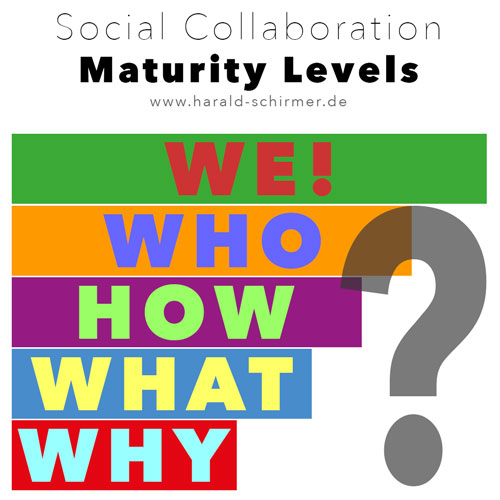 Working in virtual teams requires a new set of communication and collaboration skills. Based on todays available technology we have many more options for collaborative work without the limitation of time and location. Accepting that virtual collaboration is a compromise, it is the status quo for our todays work with colleagues, teams, companies, customers or suppliers.
Working in virtual teams requires a new set of communication and collaboration skills. Based on todays available technology we have many more options for collaborative work without the limitation of time and location. Accepting that virtual collaboration is a compromise, it is the status quo for our todays work with colleagues, teams, companies, customers or suppliers.
Social Media has shown us many advantages – but not everyone can see them yet.. or trusts their promises. We can compare the impact with going from handwritten letters and Overhead-Projectors to eMail and Beamers – the last communication „update“.
Ask yourself:
Could you do your job
with handwriting and static foils – today?
Social Collaboration is the logical next level, enabling us to engage network communication, reducing the known physical limitations … being an answer for the demands of an agile, complex world, where not One final Answer but diversity leads to success.
With the experience of a decade of internal and external adoption, here is a first summary of typical „levels“ which I realized:

Start with WHY?
Every Change starts with questioning it, putting it into contrast with what we know and do. Social Media had a quite hard start, since the most influencing factor (our public media) – specially in Germany – made fun of this new trend. When Facebook and Twitter came up, we could hear from TV moderators, politicians and journalists how „stupid“ this new media is: People sharing their headaches, pictures from food and cat-videos – even posting from the toilette. For me it always seemed like they immediately understood, that this is going to change their „universe“ first… and it did.
Unfortunately they never stated it different, but started evolving, integrating it into their formats, using it for instant feedback, reaching masses, re-using news-streams, quotes and live images.
In addition there is this huge privacy issue. Just recently someone told me: „I started with Facebook, but after I have seen all those questions about me, my family, education, preferences, likes and dislikes… I immediately deleted my account“ … not knowing that questions in Social Media are not to compare with a tax-form:
there is absolutely no requirement
to share any information,
which you are not confident in doing so!
Level ONE is still asking about the „WHY SHOULD I INVEST TIME“ in getting to know it. People don’t see a need, or focus on the arguments against it.
There are various starting points, when people get engaged in something new:
- Force … a person, system, one-self demands it
- Curiosity … typically starts when trusted peers are role models
- Social Pressure … once the critical mass is changing… it seems in-evitable
- Acceptance … logic driven people start, once they get good arguments with personal impact
- Purpose … connecting it to another topic, which has a meaning already
- … many more
People are often referencing new things with what they did before and try to copy their former behavior and processes into the new environment. (which often fails because of the wrong perspective, expectations and fears)
In hierarchical Organizations, where competition is the dominant culture, the typical approach to initiate change is „Top Down Demand“ (which in most organizations is not happening, since the leaders are not convinced of the power of social collaboration). compare to organizational evolution levels
Many hope for the Bottom Up change, like in the private world, forgetting about the completely different environment there. Starting from the „free choice“ of technology, devices, peers and subject to the social reputation, which is very different in private life compared to the business.
There is a big difference comparing the organization of a private event with friends via Social Media and using it for a project. In private there are no rules, no processes, no lean approach, no quality gates, dead lines or reporting measures – so a structured collaborative approach is always an enhancement to „dozens of un-coordinated phone calls“. In our already structured and optimized business surrounding, we need a professional approach. First we need to question, what the main benefits are, and how they could add to the project success. (This can not be done by people just starting to learn about Social Media!)
Here lies the biggest problem of our time: With the little understanding of (or belief in) the benefits of Social Media, it is hard for deciders to see the benefits – even if the arguments are spoken out. Words like transparency, trust, participation, involvement, network have a completely different meaning.
Examples:
I often talked about transparency as one major aspect:
What many understood is: Everything is visible, BigBrother is watching, no privacy, vulnerability, fear…
What I tried to talk about is: engaging social learning, creating options by a higher visibility of relevant information, building trust by feeling respected (as one who can handle it)
Another one is appreciation:
I typically got the answer: „I know, I do it already, what can I concretely do more…“ – talking about actions
What I try to express: Appreciation is an attitude, a mindset, which sees every person as a valuable human being. A leaders task is to find and develop this value…
Networking:
What people talk about: Coffee corner, coming together without agenda, unstructured chit-chat without a goal, no rules, no efficiency
What I learned and share: A discipline based collaboration method for unlimited participation, an engagement and purpose driven method of goal oriented co-creation with the freedom of taking a holistic picture into account, a cultural and functional divers way of learning about various perspectives and processes to reach a higher (typically more complex) goal.
Compared to eMail and phone, Social Media is a more complex answer to a complex world. The expectation to put it into our so limited language is making it so challenging.
Social Collaboration aims for an involving
and more holistic picture of things…
and that is beyond
yes/no, right/wrong or true/false
… it is a lot richer!
coming up next: „WHAT“…

Schreibe einen Kommentar